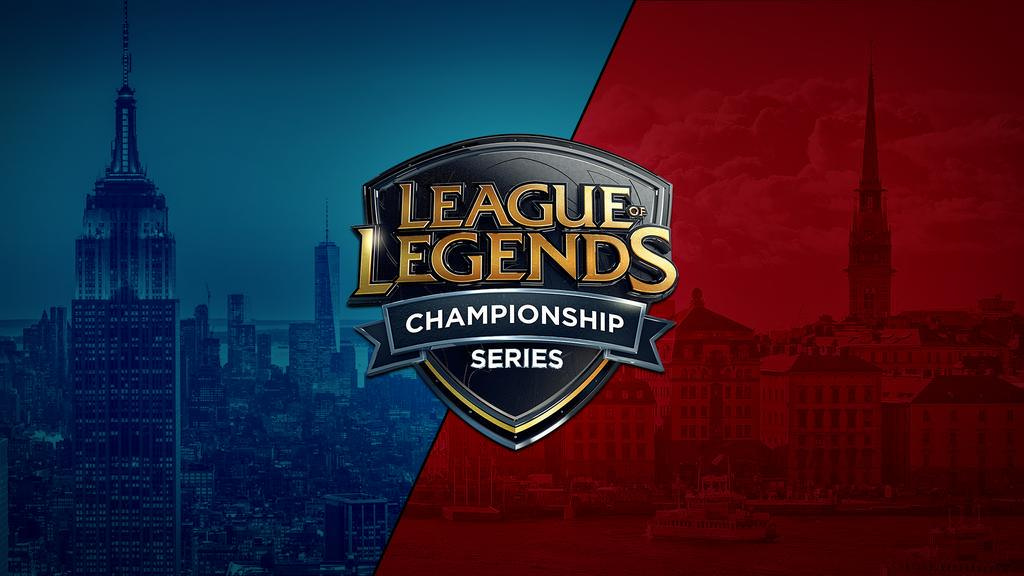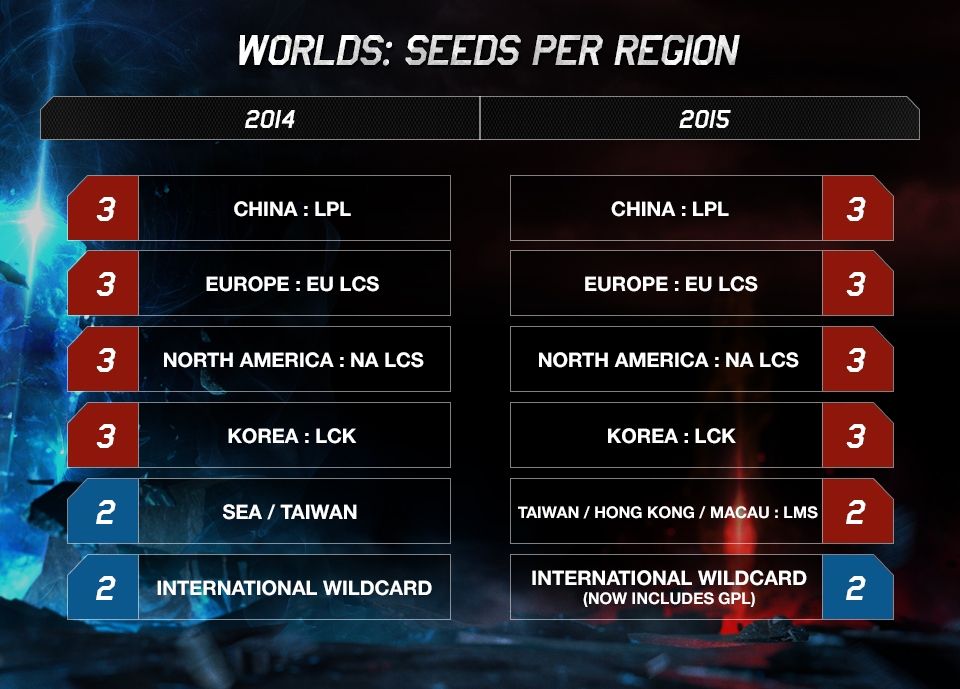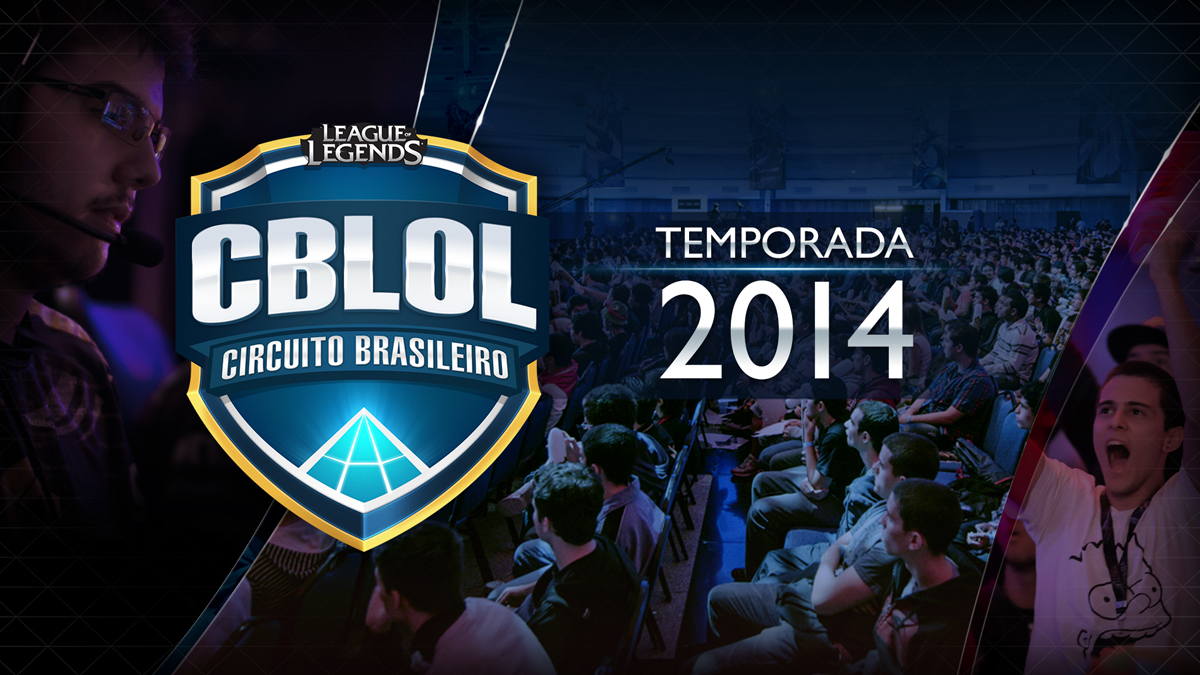The case for a bigger LoL World Championship

Often, the expected news is good news. Taiwan, as widely anticipated, has taken up the two World Championship seeds from Southeast Asia, as according to the recently announced details about the upcoming League of Legends World Championship. The LoL Master Series' inaugural year's already done much to prove the shortened Taiwan/Hong Kong/Macau circuit more worthy of the slots—not just in the rest of their former Garena Premier League's total defeat at IEM Taipei, though their comparative performances then told a very convincing story indeed.
At the time, ahq E-Sports Club's Shu-Wei "Westdoor" Liu had not yet claimed the title of LMS's top mid laner—yet he was glassing the Vietnamese, Thai and Australian teams just as casually as the rest of his peers. That alone might not have proved that the LMS was worthy of recognition as a premier circuit, as Taiwan's already spent years battering Southeast Asian teams around without much to show for it internationally.
Then Westdoor and ahq showed up at Tallahassee and made Team Solomid look like first-time players, stalled the progression of an increasingly admirable Fnatic, and gave Faker a scare. Not bad for a region that people were arguing should be relegated to wildcard status, just the month prior.
But, strangely, though the World Championship circuit is unchanged from last year, and the only real difference is Taiwan's confirmation in place of SEA's, it's feeling a little crowded in here. This might, and even should, be the last year with the current seed allotments.

Across the world
The five premier circuits are North America LCS, Europe LCS, China's LPL, Korea's LCK and Taiwan's LMS. But the biggest developments to League of Legends may have occurred unnoticed outside of them. Turkey's Besiktas sports club added esports to their portfolio back in January, quickly becoming the dominant team of their home circuit. Over at Brazil, CBLoL's churning in ever-increasing ferocity—they were actually among the first to recruit Korean players, and INTZ was largely considered the strongest team outside of the world of the five premier regions.
Elsewhere, newer circuits were being established. Japan entered the fray with the LJL, enthusiastically adopting MOBAs despite the double-barriers of not having a strong local PC gaming culture, and stuck using North American servers instead of a closer region (South Korea requires national IDs; ping to China and Taiwan isn't superior to NA). Latin America and the Commonwealth of Independent States were also gearing up their own local circuits. And over in Australia, the OPL was kicking into full swing, with the Chiefs appropriately leading the region's development.
In terms of comparison, there were now over seven minor circuits... but competing for a mere two slots at Worlds.
Keep up to date with the most important stories and the best deals, as picked by the PC Gamer team.
Granted, the wildcard regions have demonstrated weaknesses. Southeast Asia's second-best team, the Bangkok Titans, demonstrated at the International Wild Card Invitational that a former premier region still has a leg up over most of the rest of the wildcards. They swatted aside everybody but Turkey and Brazil in their pursuit for a slot at the Mid-Season Invitational. And in most years, the wildcard representatives at the World Championship have been no-shows, losing every last game they show up to.
...except for one famous exception, just last October. Alliance, the great European hope spearheaded by Henrik "Froggen" Hansen, successfully played a rare perfect game against Korea's NaJin Shield. Yet it was Brazil's Kabum that beat them in turn, the next day, playing a major role in Alliance's failure to advance.
It was a fluke, many would argue (and I am inclined to agree). It wouldn't have worked if the group stages weren't best-of-one sets. And that's fair. But in previous years and tournaments, the gap between Wildcard and Premier teams wasn't just a matter of preparation and strategy—Team Solomid was able to beat aside GamingGear in 2013 with an insultingly arrogant Teemo pick and still swept through off stronger player mechanics.
The worst you can say about them is that they're where LCS teams were at mid-2013, getting used to the more rigorous and consistent competitive schedule. But if so, then calling them "wildcards" feels amost like shortchanging them.
The case for inclusion

It isn't just a matter of wildcards playing better. It's not as if they're serious contenders for the Worlds title (yet)—if there's still a gap between them and LCS representatives, there's a wider chasm yet between them and the top Chinese and Koreans. But there's a moral case to be made—given their infrastructural investments and dedication to growth, it seems only fair that they be treated with the same prestige as the more senior circuits they've successfully emulated. It seems only fair that Brazilian, Turkish, Vietnamese fans among others are given the same level of recognition and respect as any other player. They, too, are a part of the international esports ecosystem, even if they don't have nearly as many resources to tap.
But there's a side benefit to seeding them: bringing those resources to them in the first place. When discussing why the World Championship had wildcard seeds at all, Riot's stated their desire to support newer and less well-off regions. The Championship should, after all, be a celebration for all those that play and enjoy League of Legends. And arguments can be made that a weakened or eliminated wildcard presence is liable to kill interests in the minor markets. Instead, the hope of Worlds glory has kindled greater and greater investments, both emotional and otherwise.
But as the Championship is, that token show of respect has effectively reached its limit. Seven wildcard regions, all practicing and competing week in and week out, and they need a year's-end outlet to make that effort worth it. If Season 3's North America was as worthy of Worlds representation as the already-entrenched Korean circuit, then surely Brazil and Turkey's overdue for the same.
As the LMS has demonstrated, the chase for Worlds can turn a slacking circuit into a competitive powerhouse. The difference between being recognized as a "real" circuit and a wildcard is the difference between ahq E-Sports Club and the numerous Insidious Gaming teams in Singapore—the teams you can practice against, the sponsors you can call upon, and the overall seriousness with which you're treated.
The 2015 Worlds setup looks great. But for 2016 and beyond, it's time for Riot Games to share the honors with the rest of the world.

